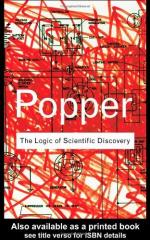
|
| Name: _________________________ | Period: ___________________ |
This test consists of 5 multiple choice questions, 5 short answer questions, and 10 short essay questions.
Multiple Choice Questions
1. What does Popper suggest uncertainty statements are derived from?
(a) Universal statements.
(b) Unknowns.
(c) Singular statements.
(d) Logical statement.
2. If two statements have equal logical content what must also be equal?
(a) Their logical probability.
(b) Their inductive reasoning.
(c) Empirical content.
(d) Their justification.
3. What do some researchers suggest occurs when the probability is paired with testability?
(a) Probability is eliminated.
(b) Both remain equal.
(c) Probability decreases.
(d) Probability increases.
4. What formula, developed by Popper, suggests that no aggregate of particles is more homogeneous than a pure case?
(a) Particle formula.
(b) Wave formula.
(c) Statistical scatter relations formula.
(d) Statistical pure case formula.
5. What increases with the amount of falsifiability?
(a) The complexity of a study.
(b) The amount of information.
(c) The opportunity for error.
(d) The level of research.
Short Answer Questions
1. What does Popper feel about an axiom in relations of von Mises view of an axiom of randomness?
2. How do conventionalists define simplicity?
3. What theory suggests that simplicity is expected to achieve a law-like regularity of events?
4. What does Popper claim can never be probable?
5. What are easier to test and falsify?
Short Essay Questions
1. Using Heisenberg's Uncertainty Principle, what does Popper attempt to prove?
2. Why do falsifiable statements hold the greatest promise for science?
3. What are the two main sources for hypothetical estimates of frequencies with regard to infinite empirical sequences?
4. What is the basic contribution that Popper makes to the logic of the theory of probability?
5. What role does simplicity play in theories of inductive logic?
6. What does Popper suggest about corroborations?
7. What is the basis of the wave theory used by Schrödinger?
8. Why does Popper prefer quantitative over qualitative methods?
9. Why does Popper feel that intersubjective objectivity must be applied to statistical statements?
10. What two scientific arguments does Popper use to verify his beliefs about inductivists?
|
This section contains 789 words (approx. 3 pages at 300 words per page) |

|




